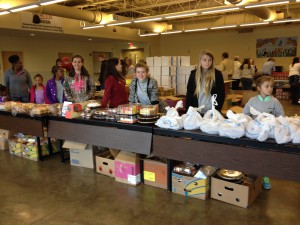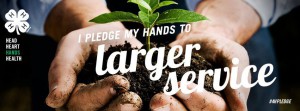Clear evidence of mastering a skill is being able to employ it in one’s everyday life. Knowledge is only as good as how we are able to use it. 4-H dedicates itself to educating youth with research based curriculum not only for their own benefit but also so they can share that knowledge with others. When we “pledge our hands to larger service”, this can take on many forms. It may look like teaching youth in a community center about robotics or gardening, making meals for the military and first responders, or cleaning up trash in local parks. In all our service, it is important that regardless of what this looks like that we focus on meeting a need in our community. Identifying these needs is sometimes difficult if they are not part of what we see around us regularly. Talking to people who do not have the same life experiences we do is a good way to start seeing the world in a different way and thinking about ways you can help others who haven’t had the same opportunities. In Escambia County, around 30% of our youth population lives in poverty (US Census). Outcomes of living in poverty are hunger, poor housing, poor health, and lower educational scores, just to name a few. Our 4-Hers are learning to use the skills they have gained in 4-H in creative ways to help address some of these issues. One club has received a grant to raise a hog that a youth will show and have processed so the meat can be included in food boxes for local families. Another club raised funds to help support the Council on Aging to provide air conditioning units to the elderly, who are more likely to be impoverished, during the hot summer months.

Escambia County 4-Hers assemble food boxes for local families at this year’s Farm to City event.
Whether poverty, pollution, safety, education, healthcare, or another issue is one that effects your community, the skills youth learn through 4-H can help address it. Not only does this help those around us live healthier and more productive lives, but it helps those who serve connect to their community and learn to give back. As with all 4-H projects, our goal is to help youth become more engaged and knowledgeable citizens that contribute to their world in positive ways. We encourage our youth to embody the spirit of generosity all year long, but during this season, be sure to explore the needs in your community you can help to change, even in the smallest way. If you need help thinking of how to best give back, contact your local 4-H Agent, local non-profits, or look up your county’s information in a database such as the US Census’ QuickFacts (http://quickfacts.census.gov/qfd/states/12000.html) and think about what kinds of problems might arise from the information you find there.
4-H also offers many Leadership and Citizenship projects that can help youth navigate assessing the needs of their community and putting their skills to use. You can find a few such project guides at the following links:
- Senior Leadership Project: http://4h.msue.msu.edu/uploads/files/GovernmentIsUsCurriculum.pdf
- Junior/Intermediate Citizenship Project: http://escambia.ifas.ufl.edu/4h/files/2015/09/ClubLeadershipProject.pdf
- Civic Engagement Project guide: http://4h.ucanr.edu/files/124237.pdf
- Cloverbud Leadership guide: http://www.bookstore.ksre.ksu.edu/pubs/S102_LEVEL1.pdf
If you are interested in helping guide the next generation to be compassionate, active citizens for tomorrow, consider becoming a 4-H Volunteer. 4-H offers a wide variety of roles to fit your interests and schedule. Visit http://florida4h.org or contact your local UF IFAS Extension Office.
US Census. 2015. American Community Survey 2009-2013 five-year estimates, Children Characteristics: Escambia County, FL. Accessed November 18, 2015.
- Bleeding Green with Senior 4-H’er Danielle Tinker - May 20, 2016
- 4-H Teaches Youth to Think Globally and Act Locally Through Energy Conservation Education - February 19, 2016
- 4-H Meets Community Needs through Service - December 19, 2015

